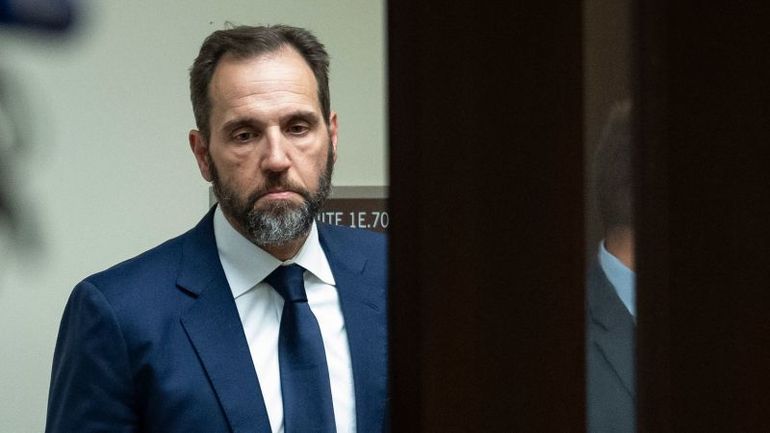
Special counsel criticizes judge's handling of Trump documents case

In a scathing critique of Judge Aileen Cannon's actions in the case involving classified documents linked to former President Donald Trump, special counsel Jack Smith lodged strong objections in recent court filings. Smith argued that the judge's request for briefings was based on a fundamentally flawed interpretation of the case, lacking legal or factual basis.
In a recent court filing, special counsel Jack Smith strongly criticized Judge Aileen Cannon's handling of the classified documents case against former President Donald Trump. Smith stated that the judge's decision to order briefings was based on a flawed understanding of the case, which he believes has no legal or factual basis.
Smith's team also took issue with Cannon's request for jury instructions that supported Trump's claims of having broad authority to access classified government documents. They warned that they would seek a review from an appeals court if the judge agreed with the former president's arguments regarding his record-retention powers.
In a unique development last month, Cannon requested attorneys involved in the classified documents case to submit briefs regarding potential jury instructions that would define terms of the Espionage Act. This act is the basis of the charges against Trump for mishandling 32 classified records. Specifically, Cannon asked both the special counsel and defense attorneys to prepare two different versions of proposed jury instructions.
The first proposed scenario would guide the jury in determining whether each of the records that Trump allegedly kept fell under the categories of "personal" or "presidential" as outlined by the Presidential Records Act. This law, established after the Watergate scandal, governs how White House records belonging to the government are to be managed at the conclusion of a presidency.
Cannon's second version assumes that Trump, as president, had the authority to take any records he wanted from the White House. This would make it difficult for prosecutors to secure a conviction. Smith's team mentioned that if this instruction were implemented, the Government should have the chance to seek prompt appellate review.
The special counsel's team pointed out that both scenarios rely on a flawed legal premise. They argued that the Presidential Records Act, specifically the distinction between 'personal' and 'Presidential' records, should not determine whether a former President is allowed, under the Espionage Act, to possess highly classified documents and store them in an unsecure facility.
Prosecutors said that allowing it to be presented to a jury would distort the trial. Cannon made the request after hearing arguments about the former president's authority under the Presidential Records Act. Trump's attorneys argue that he had the authority to classify records as personal and have asked the judge to dismiss the charges.
Trump's defense attorneys submitted their own proposed jury instructions on Tuesday evening. In the first hypothetical, they suggested that Trump was "authorized" by the PRA to "possess a category of documents defined as 'personal records,' both during and after his term in office."
In the second scenario, the defense attorneys stated that "there can be no appropriate jury instructions relating to factual issues" because that scenario prevents the prosecution of President Trump.
Trump's attorneys argue that Smith faces a challenge in proving that the former president knowingly kept the documents, suggesting that it is impossible to determine someone's past thoughts.
Prosecutors have consistently maintained that the Presidential Records Act (PRA) is not relevant to the charges against Trump, emphasizing that the alleged misconduct occurred after his presidency. They reject Trump's assertion that he considered the records personal, labeling it as a fabrication created only after the National Archives retrieved classified information from Mar-a-Lago.
Their recent filing provides more information about the evidence gathered by investigators regarding Trump's record-keeping practices while he was president. Prosecutors stated that there is no proof that Trump identified the classified records as personal upon leaving the White House. They also mentioned that Trump only learned about this power months later from a conservative legal group leader.
During the hearing, Cannon seemed hesitant about dismissing the charges outright. However, she acknowledged that Trump's lawyers presented strong arguments that could be suitable for a trial jury to consider.
Cannon has not yet made a final decision on the request to dismiss the case. Her request for potential jury instructions suggests that she is still thinking about how the Public Records Act (PRA) relates to the overall case.
Editor's P/S:
The recent court filing by Special Counsel Jack Smith highlights the ongoing legal battle surrounding former President Donald Trump's handling of classified documents. Smith's criticism of Judge Aileen Cannon's handling of the case reflects the complex legal issues at play, particularly regarding the scope of executive authority and the boundaries of presidential record-keeping.
While Trump's defense attorneys argue that he had the authority to classify records as personal and that the Presidential Records Act (PRA) is not relevant to the charges, prosecutors maintain that the alleged misconduct occurred after his presidency and that the PRA does not grant immunity for mishandling classified documents. The ongoing debate over potential jury instructions underscores the need for a clear understanding of the legal framework surrounding classified information and the responsibilities of former presidents in preserving and securing such records. The outcome of this case has significant implications for the handling of classified information and the accountability of former presidents in the future.













